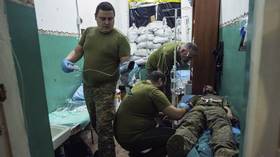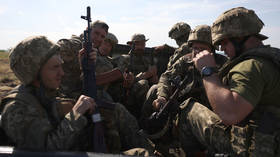Ukrainians bringing treatment-resistant infections to Western Europe – health agency

Wounded Ukrainian soldiers and fleeing civilians are carrying new strains of antibiotic-resistant bacteria to Western Europe, according to a recent paper by the US Centers for Disease Control and Prevention (CDC). Even before the conflict, scientists warned of Ukraine’s inability to monitor and restrict the spread of these infections.
The paper, published last month, noted that six different antibiotic-resistant infections had been found in the body of one injured Ukrainian soldier at a military hospital in Germany. The soldier suffered severe burns in a vehicle fire and had been moved through hospitals in Dnipropetrovsk and Kiev before his evacuation to Germany.
German researchers found that some of these infections had been found in the wounds of Ukrainians fighting in the Donbass regions since 2014 and had likely developed in Ukrainian hospitals.
“As a result, healthcare networks in Europe now consider prior hospitalization in Ukraine to be a critical risk factor” for so-called multi-drug resistant organisms, the paper warned.
These infections, which have circulated within Ukraine for nearly a decade, are also being carried into Western Europe by civilian refugees, the Financial Times reported on Monday, citing multiple scientific papers.
Tracking and tackling drug-resistant infections poses a challenge for even the best-developed healthcare systems, with the Financial Times noting that one “prestigious hospital in New York” prescribes antibiotics without carrying out sufficient tests and does not dispose of unused pills – both factors in the spread of these organisms.
Not all governments have adequate plans to respond to drug-resistant infection outbreaks either. A recent analysis of 114 countries rated these plans on a scale of 0-100, giving Ukraine a score of 29, compared to 45 and 54 for neighboring Poland and Russia, respectively.
The analysis was conducted in 2021, and the subsequent conflict has likely lowered Ukraine’s score further. The Financial Times noted that widespread combat injuries, indiscriminate prescription of antibiotics, and damage to hospital infrastructure all facilitate the spread of disease.













